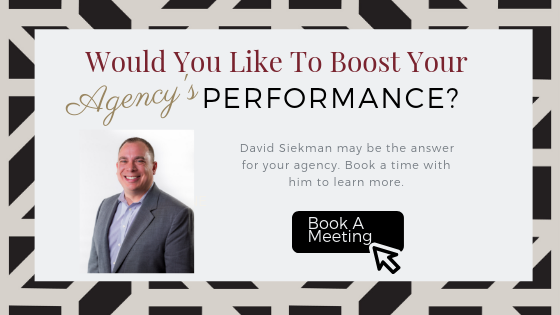Working with so many insurance agencies across the United States and Canada provides the opportunity for me to learn about a variety of really positive ways agencies are growing their businesses and servicing their clients. Part of our agency assessment is spending time in one-on-one discussions with the team and observing their regular routine. It is mostly positive, however, it also means I sometimes hear a few common phrases that can make me cringe!
This list is in no particular order, but I present The Top 9 Things I Hear in Insurance Agencies That Make Me Cringe:
1: “I’m not in sales”
I’m not sure why sales gets such a bad rap, especially in an industry where we are providing such a valued product. Most clients don’t know what risks they are exposed to, the solutions to protect against those risks, or that you offer those solutions. It’s a bit of a cliché, but it is also true; everyone is in sales. It is everyone’s responsibility to sell. Good service is providing the client with what they need, not what they ask for. That is exactly what sales is.
2: “Apples to apples”
I don’t believe we need a dec page to quote insurance most of the time (there are certainly some exceptions). Some feel the need to know what someone currently has to be able to advise them on their proper protection. I will concede this knowledge can be helpful when asking for the business. However, I’ll never understand wanting to do an “apples to apples” comparison and then trying to increase the coverage to what they need. People hate buying insurance, so they will always default to what they currently have versus spending more money. Skip the apples to apples proposal and start at a higher level so they see your value. If you build rapport and trust, they are going to want to do business with you regardless of the policy.
3: “Full coverage”
I don’t even know what this one means. Does it mean physical damage or high liability limits? Does it mean every single coverage available at the highest limit? Whatever the intent, it is very misleading and can certainly open you up to an E&O exposure. There is also no opportunity to educate the client or position yourself as an expert when you use vague terms. Take the extra 60 seconds to walk through the coverages as a way to get them interested in buying from you.
4: “It is what it is”
I hate hearing this in all aspects of life. There are certain things we cannot do anything about (weather, taxes, etc.), but when I hear this as a reason why we can’t change, I definitely cringe. “It is what it is” is simply an excuse for people who don’t want to try harder. We need to do what is right for our clients, not what is simple and easy for us. Every time I hear this line I hear it as a cop-out to avoid effort.
5: “My computer is running a little slow”
I’d put this in the same category as “we are a little short-staffed today”. No one cares or wants to hear about the issues you have preventing you from providing them with what they need. We need to perform at a high level in spite of any obstacle presented. The easiest way to avoid this is to remember the client has no real understanding of how long something should take. Simply perform to the best of your abilities and the client will be satisfied. Excuses just make them feel like you’re complaining to them.
6: “Billing doesn’t know what they are doing”
This one isn’t just billing. I hear this with underwriters, claims, producers, account managers, etc. First, it is just a little tacky to throw someone under the bus. Second, you may not know all of the information to make this judgement. It could come back that you are wrong, so now you’ve put yourself in a worse position. And finally, even if it is true, why would I want to do business with anyone who doesn’t know what they are doing? Why did your agency place me with a carrier that doesn’t know what they are doing? Why would I want to do business with your agency if there are people in other departments who don’t know what they are doing?
7: “This is your client”
I realize a lot of agencies utilize an alpha split or other methods of distributing work. I don’t have any problem with creating a process like this; however, when the distribution process breaks down, just help the client. Helping the client should be the number one priority. If the process broke down or if it breaks down on a regular basis, fix what’s broken with the process. Don’t make the client suffer as you debate who should solve the problem. I hear this one a lot between account managers but also between sales and service. Again, fix the problem and then figure out who should’ve solved it. If you are trying to create a Ridiculously Amazing Customer Experience, you can’t start with debating who is going to create the experience.
8: “Is it okay if I get this to you next week?”
There are two parts of this that make me cringe. First, most sales and service issues can’t wait over a weekend (again, there are exceptions here). If you let a weekend pass, it is too easy for the prospect to get distracted and start looking elsewhere. For existing clients, you are certainly not creating a great customer experience for them. Best case scenario: they feel like you did your job—not the high bar we want to set for ourselves. The other part of this that makes me cringe is allowing the client to drive the process. The client doesn’t know the path to the solution, so why are we allowing them to help control where we go? In our AppX Sales and AppX Retention programs, we train on figuring out a specific time that week to have the issue addressed and how to time manage to hit that deadline.
9: “I’m so busy”
For those of you that follow us, I’m sure you knew this one was coming. Successful people are productive, not busy. Busy is just another excuse for not accomplishing something you should have accomplished. No one wants to hear that you are busy. Saying it out loud just makes it seem like you are disorganized or unfocused. I’d argue the whole attitude and approach is creating an environment where you are setting yourself up for failure.
What about you? Which ones did I miss? What do you hear your co-workers say that makes you cringe? What do you say that is cringeworthy if you do an honest self-evaluation? Most of these items come down to culture and process. A good culture and a strong process (that is followed) are built around avoiding excuses and providing a higher level of service.




